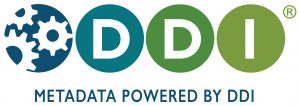 The Data Documentation Initiative (DDI) Alliance is pleased to announce the first Public Review of DDI – Cross Domain Integration (DDI-CDI), a specification aimed at helping implementers integrate data across domain and institutional boundaries.
The Data Documentation Initiative (DDI) Alliance is pleased to announce the first Public Review of DDI – Cross Domain Integration (DDI-CDI), a specification aimed at helping implementers integrate data across domain and institutional boundaries.
Although historically the DDI Alliance has produced specifications aimed at the Social, Behavioral, and Economic (SBE) sciences, DDI-CDI is designed to serve a broader audience, reflecting the need across many different domains to exchange and reuse data which comes from outside the traditional range of data sources. It is intended to be used as a stand-alone specification for data integration in any domain or combination of domains and it can be used in combination with existing DDI specifications (e.g., DDI-Codebook and DDI-Lifecycle).
Reflecting this broader objective, CODATA sees great potential in DDI-CDI as a contribution to the International Science Council-endorsed Decadal Programme ‘Making Data Work for Cross-Domain Grand Challenges’. Consequently, CODATA through the Decadal Programme will partner with DDI in the public review process, assisting in getting feedback on the specification from different domains and use cases.
DDI-CDI focuses on a uniform approach to describing a range of needed data formats (traditional wide/rectangular data, long [event] data, multi-dimensional data, and NoSQL/key-value data) which allows them to be connected and understood to support transformation and processing for integrated use. It is explicitly designed to work with many popular generic technology standards such as PROV-O, BPMN, DCAT, SDMX, DataCube, SSN/SOSA and Schema.org to allow for easy integration into systems which support them. DDI-CDI is aligned with other DDI specifications (DDI-Codebook, DDI-Lifecycle) to support integration of external data in systems which use DDI.
Review by experts both within and outside the SBE sciences will assist in making sure that DDI-CDI is able to describe data and its provenance at a detailed, machine-actionable level. This Public Review is intended not only to critique the existing model and XML syntax representation, but also to identify places where additional work is needed to better support research and policy in the broadest possible set of domains.
Links to the specification and instructions for comment are found at https://ddi-alliance.atlassian.net/wiki/x/IQBPMw. We are eager to obtain feedback from the broadest possible audience on this specification. The comment period is open until July 31, 2020, and we hope to hear from you. To assist you in your review we recommend the following approach:
Read the Overview section of the DDI-CDI review page. This provides a guide to what you will find in the download package. There are four documents linked from the Overview section. Looking at these in the order presented will provide you with information on the purpose, organization, use, and structure of DDI-CDI. Depending on your areas of interest and expertise you may be focusing on specific aspects of the package. These documents will help guide you to the relevant material. If you have questions about the package contents and how to review them, use the issue form or email option to ask for clarification. Find these options through the link in the upper right frame of the review page.
 We will be conducting a series of webinars to introduce potential reviewers to DDI-CDI. CODATA will support and collaborate on this series. Webinars are being planned for core DDI stakeholders and users and then for a wider range of domains and use cases, including: Earth sciences, life sciences, engineering, physical sciences, SDGs and policy monitoring indicators, discovery standards, process and provenance. If you are interested in attending, please contact us by replying to this email.
We will be conducting a series of webinars to introduce potential reviewers to DDI-CDI. CODATA will support and collaborate on this series. Webinars are being planned for core DDI stakeholders and users and then for a wider range of domains and use cases, including: Earth sciences, life sciences, engineering, physical sciences, SDGs and policy monitoring indicators, discovery standards, process and provenance. If you are interested in attending, please contact us by replying to this email.
Your feedback to DDI-CDI is appreciated.
Simon Hodson, CODATA
On behalf of the initial Decadal Programme activities and in support of DDI-CDI
Joachim Wackerow, Chair of the Scientific Board of the DDI Alliance
On behalf of the DDI-CDI development group